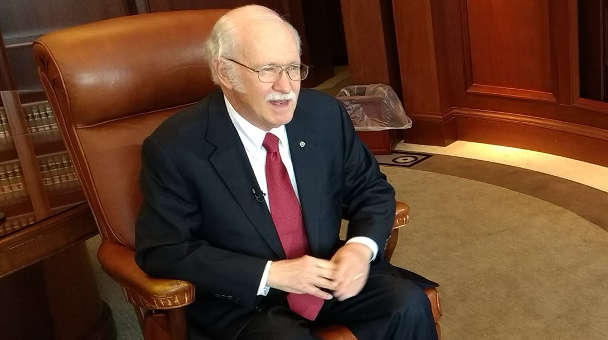Muzzle Removed from Alabama Justices After Speech Case Victory
Last week, a federal district court in Alabama issued a preliminary injunction in favor of Liberty Counsel’s client, Alabama Supreme Court Justice Tom Parker.
This injunction grants all Alabama judges the freedom to publicly comment on cases pending outside of Alabama, and judges may also comment on a pending case in Alabama if their comments cannot reasonably be considered to influence the outcome.
Previous to this injunction, all Alabama judges were prevented from commenting publicly on any cases anywhere in the United States by Alabama state Judicial Canon 3A(6). The court ruled there is “a likelihood that Canon 3A(6) is overbroad when it touches speech about issues, particularly when such speech concerns pending or impending proceedings outside the Alabama system, or where the comments could have no impact on the outcome or fairness of a proceeding.”
The Court found that Justice Parker has shown a substantial likelihood of success on the merits that Canon 3A(6) is likely unconstitutional because it is too broad. It stated, “a judicial candidate’s view of issues, especially local and domestic ones, is of immense interest to an electorate choosing which judicial candidate to support. Yet when Alabama prohibits judicial candidates from speaking about them simply because they happen to arise in the context of a proceeding somewhere, the state has shirked its responsibility of narrowly tailoring its speech restrictions.”
Judicial standards similar to Alabama’s canon were abandoned long ago by the American Bar Association. The Alabama Judicial Inquiry Commission (JIC) has shown its willingness to use the ban to punish and silence judges like Justice Parker if they comment on any case no matter how removed it may be from Alabama. This speech restriction is so broad it would have prohibited a sitting judge who teaches or speaks to law students in a law school classroom from commenting on any pending case anywhere in the country.
Two and a half years ago, Justice Parker participated in a radio interview answering questions on a wide-range of issues, including his thoughts on matters of paramount constitutional importance. That he dared publicly express his professional views triggered the Southern Poverty Law Center (SLPC) to lodge an ethical complaint against him.
That complaint generated a yearlong investigation by the Judicial Inquiry Commission. That inquisition, and lengthy litigation, was based on nothing more than Justice Parker’s exercise of his constitutionally protected freedom of speech. The SPLC hoped to remove him by filing the complaint against him.
The district court first dismissed Justice Parker’s lawsuit because the JIC’s investigation was still pending and the federal court abstained from the matter. However, while the appeal of that case was pending, the JIC dismissed the SPLC’s complaint. The Court of Appeals unanimously agreed to Liberty Counsel’s request for the lower court to rule on the lawsuit against the canon because of its overly broad and unconstitutional restrictions on judicial speech.
“This is an important victory for free speech for not just Justice Tom Parker but for all judges,” said Mat Staver, Founder and Chairman of Liberty Counsel. “This is also a victory for the public, because they have a right to hear what judges want to say about the law, especially during elections, It was unreasonable to gag every judge in Alabama from talking about current issues. Every judge who teaches law school students would be silenced by this broad restriction on speech. Now, they are free to speak and teach. The muzzle has been removed.”
Justice Parker is currently an associate justice of the Alabama Supreme Court and is running for the position of chief justice.
For the original article, visit lc.org. {eoa}




























































